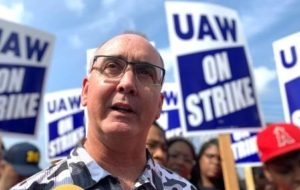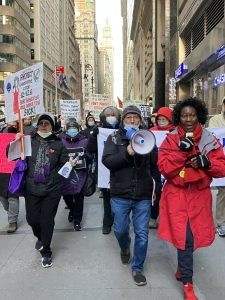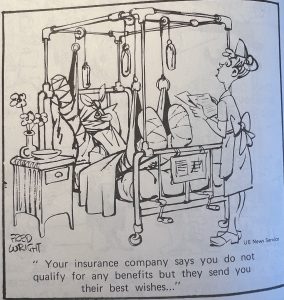Some big wins for labor over the past couple of months have signaled the rising power of the union movement. It may well be the opening shot across the bow against corporate attacks on unions over the last four decades that has resulted in a steady decline in the standard of living of working people.

UAW President Shawn Fain, shown with striking workers, has pledged an agressive organizing campaign at non-union auto facilities., Mandi Wright, Detroit Free Press
The biggest wins for workers were in the highly successful strike by the United Auto Workers against the Big Three car manufacturers – GM, Ford, and Stellantis. Instead of the usual strike against the entire company at once, it adopted the rolling strike tactic, hitting a limited number of auto factories at each carmaker at a time. The companies never knew which would be next and the strikes at plants that played a vital part in car production affected production as a whole in other places.
And by framing the strike, not only as one conducted by a union against management, but as a fight for working people against the greed that has resulted in huge growth in corporate profits at the expense of declining standards for America’s working people, UAW President Sean Fain ignited the fighting working class spirit that built the union movement in decades past.
When the Big Three finally caved after about six weeks, the resulting contract the union won was the best in the union’s history, unmatched since the contracts won in 1937 after the Flint, Michigan, sitdown strike that built the union. The principal terms of the contract have been reported widely. Outstanding among them are a 25 percent wage increase over the four-and-a-half year contract and an end to the two-tier wage system that saw younger workers never able to earn what workers hired earlier could earn. An end to their second class status and their elevation to the pay scale enjoyed by older workers will give them extraordinary pay raises, in some cases up to 150 percent. The union also won a restoration of the cost-of-living (COLA) adjustment that had been a feature of UAW contracts from 1948 to 2008 when the union gave in to industry’s demand to end it.
And in an important union first, the contract guarantees that workers at battery production plants for its new electric cars will be included in the new master agreement, setting the stage for the union’ s announced goal of organizing non-union electric car manufacturers.
As of this writing, the contract was in the process of being voted on by the UAW membership.
Two other big wins this summer and fall were the contract won by Teamsters Union drivers at UPS without a strike but just the threat of one. In a contract agreed to just 24 hours before a strike was scheduled, 340,000 Teamster members at UPS won raises of $7.50 an hour over five years, with drivers’ pay climbing to $49 an hour and part-time workers receiving a pay increase of 48% on average. The agreement also ends a two-tiered classification for drivers, provides part-timers with longevity raises, adds Martin Luther King Day as a paid holiday off, and ends forced overtime on off days.
And the months long strike by the two unions representing TV and motion picture screen writers and actors has produced contracts with substantial gains. The Writers Guild of America, which represents 11,500 screenwriters, reached a tentative agreement with studios on Sept. 24 and ended its 148-day strike on Sept. 27. In the coming days, SAG-AFTRA members will vote on whether to accept their union’s deal, which includes hefty gains, like increases in compensation for streaming shows and films, better health care funding, concessions from studios on self-taped auditions, and guarantees that studios will not use artificial intelligence to create digital replicas of their likenesses without payment or approval.
And in just a few other recent labor actions:
In August, 15,000 American Airlines pilots won pay increases of 46% over four years. After a three-day strike earlier this month, 85,000 Kaiser Permanente workers won raises of 21%, as well as a $25 minimum wage for Kaiser’s workers in California. In March, 30,000 Los Angeles school district workers – bus drivers, cafeteria workers and teachers’ aides – won a 30% wage hike over four years. In Oregon, 1,400 nurses at Providence Portland hospitalsecured raises between 17% and 27% over two years.
And all indications are that it’s just the beginning.
NY Times, 10/31, 11/8; The Guardian, 10/24; Jacobin, 11/1





